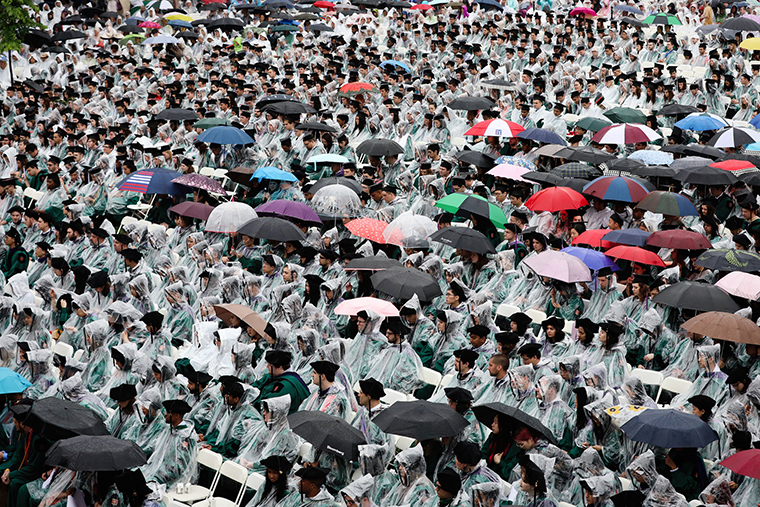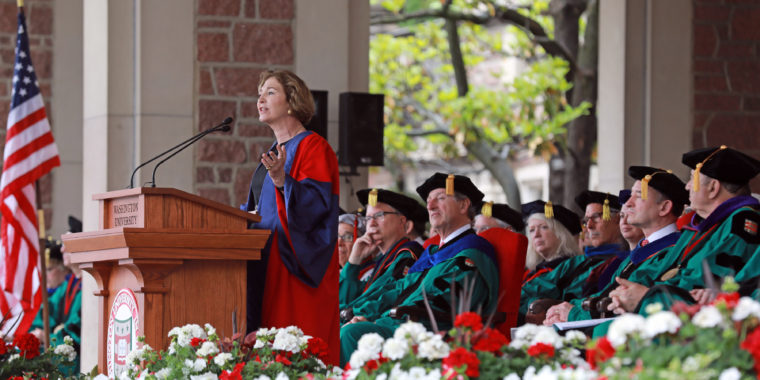The theme of “American Renewal” rang strong and true throughout the address that foreign policy expert Anne-Marie Slaughter delivered to the Washington University in St. Louis Class of 2018 at the rain-soaked 157th Commencement.
“American renewal is happening from the bottom up and the heartland out,” Slaughter said to the more than 3,100 degree candidates decked out in academic regalia underneath university-issued rain ponchos.
In all, an estimated 8,000 family members and friends of the graduates attended the ceremony in Brookings Quadrangle, simultaneously maneuvering umbrellas and cameras, while nearly 10,000 watched the live stream remotely and more than 2,500 watched from remote viewing sites across campus.
“It’s a little rainy here today in the Quadrangle, but it’s still a glorious day for the Class of 2018,” Chancellor Mark S. Wrighton said as he stepped to the podium to begin the shortened program and introduce Slaughter, president and CEO of the New America foundation and a former top official at the U.S. Department of State.
Perhaps the rain — a steady, cleansing downpour that began in the early-morning hours and didn’t let up until long after the ceremony was over — was appropriate for Slaughter’s noteworthy message of renewal and rebirth.
“Your mission,” she began, in a loud, clear voice, “should you choose to accept it, is American renewal. Not just as a graduating class, but as a generation.
“You are graduating at a moment of profound national division and political dysfunction,” she said. “It is time to renew our politics, to mount a great wave of reform as we did in the late 19th century and recreate a system that can, in fact, enact the will of the majority and respect the rights of the minority.”
Slaughter, noting that the moment in which the graduates were receiving their degrees was one in which the “very possibility of truth is in deep doubt,” called for the graduates to renew their faith in “facts, reason and the accumulation of knowledge.”
Renewal was much needed at this time and place in history, Slaughter said, because it was the best way to move forward in an age of political discourse. “(Renewal) can unite both sides of the political aisle,” she said. “Liberals embrace progress and love the new; conservatives hold to tradition and revere the old.
“But often the best way to move forward is not to tear down, but to rebuild, giving new life to the best of what is old while rejecting and discarding the worst.”

“Why renewal?” she asked. “Because it’s the American way. It acknowledges a process of striving, falling short and striving again.”
Citing historical examples from such public figures as Abraham Lincoln, Franklin Delano Roosevelt, Elizabeth Cady Stanton and Martin Luther King, Slaughter called for renewal on many fronts, such as education, health care and public policy, but she also stressed the need for social programs that strengthen and support the work of raising a family.
“We must have an economy that no longer distinguishes between full-time and part-time work, or, indeed, even between paid and unpaid work, since the work of raising a family and caring for others is just as essential to human well-being as work that brings in a paycheck,” she said. “We need a social infrastructure that provides for portable benefits, affordable and accessible lifelong education and universal health care.”
And while stating the need for renewal so clearly, she offered a blueprint for how to do so, suggesting to the Class of 2018 to not go directly from Washington University to Washington, D.C., but to go where change is happening, in cities and states.
“We must begin anew, step by step, if we are ever to rebuild public trust,” she said. “Go to where you can participate in the reconnection of citizen action to positive public outcomes.
“If you’re an aspiring business person or entrepreneur, go to where the real estate is cheap and the community is strong, where new tech sectors are springing up by reinventing traditional businesses from manufacturing to media.
“If you’re an aspiring architect, go renovate your hometown’s downtown, putting beautiful old buildings to new uses.
“If you’re an aspiring journalist, go reweave the fabric of local, civic life by creating or joining new models of producing local news.”
“Why renewal? Because it’s the American way. It acknowledges a process of striving, falling short and striving again.”
Anne-Marie Slaughter
Most notably, Slaughter called for facing difficult truths in order to be able to effect change, noting the university’s location in St. Louis, the “heart of the heartland” and a city that “embodies much of what is best and what is worst about this country.”
“In the work of renewal, facing failure is just as important as cataloging success,” Slaughter said.
She noted St. Louis’ role in racial tensions from both the past and recent history, including the death of Michael Brown and the ensuing riots that erupted in nearby Ferguson, Mo., in August 2014, just as the Class of 2018 was arriving as first-year students.
“Those riots uncovered deeper patterns of financial and political injustice and state violence that mark the boundaries of modern segregation,” she said. “We cannot celebrate the great achievements of our past without acknowledging the injustice, exclusion, violence and inhumanity that have made a mockery of our ideals for so many among us.”
Even with that, Slaughter said we cannot allow ourselves to be motivated by anger and fear. “Just as we must see the parts of our past that we wish to preserve, we must be able to imagine a future that we wish to achieve,” she said. “A future of equality for all Americans, regardless of gender, color, creed, race, sexual orientation or national origin.”
And, acknowledging a thread of protest among graduates who had added red tape to their mortarboards in support of a student-initiated “Title Mine” movement, “A future in which there will be no need for red tape in support of Title Mine,” she said, to applause.
“A future of lifelong learning and earning, caring and sharing,” she said. “A future of technology and humanity. A future — and make it yours — of remembrance and renewal.”
